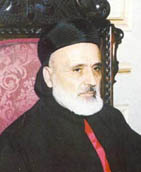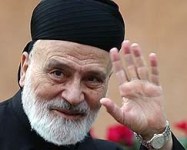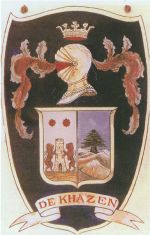BEIRUT: Maronite Patriarch Nasrallah Butros Sfeir responded on Thursday to what he described as former Minister Suleiman Franjieh's "misplaced" verbal attack on a bishop. Sfeir said he regretted Franjieh's comments and wished the former MP had not made them.
"We know that ... Franjieh is the son of the Maronite Church and a citizen of Zghorta, and that he is concerned about the Maronite Church, its children and its respect, so when he attacks a bishop I believe the attack is misplaced," Sfeir said. The prelate's response came ahead of his departure on a visit to the United States expected to last at least 20 days. During his visit Sfeir is expected to participate in a commemoration of the Maronite Church's founding in the US 40 years ago.
While the patriarch noted the importance of resolving the issue before it escalated, he stated unequivocally that "a bishop must be respected." On Wednesday, Franjieh accused Bishop Youssef Beshara of having sided with MP Saad Hariri, the leader of the parliamentary majority.
Cardinal Sfeir will arrive at Lawrence Airport on the afternoon of July 12, and will celebrate a Pontifical Liturgy at 7:30 p.m. at St. Anthony's, 145 Amesbury Street, in Lawrence. Cardinal Sfeir will celebrate a second liturgy at 9 a.m. the next morning, followed by a press conference at 11 a.m. A third liturgy will be celebrated at 9 a.m. on Friday, July 14, prior to the Cardinal's departure. As Patriarch, Cardinal Sfeir is head of the 12-15 million-member Maronite Catholic Church. There are approximately 200 million Eastern Catholics throughout the world. Cardinal Sfeir is the President of the Assembly of all Eastern Catholic Patriarchs. As Patriarch, Cardinal Sfeir is head of the 12-15 million-member Maronite Catholic Church. There are approximately 200 million Eastern Catholics throughout the world. Cardinal Sfeir is the President of the Assembly of all Eastern Catholic Patriarchs. Cardinal Sfeir also is a central figure in the Catholic Church. He offered the homily during Pope John Paul II's 25th anniversary Mass and presided over the Mass at St. Peter's Basilica honoring the deceased Vatican leader. Patriarch of the Maronite Catholic Church to Make Historic Stop in the Greater Boston Area July 12-14, His Beatitude and Eminence Nasrallah Peter Cardinal Sfeir to Visit St. Anthony's Maronite Church in Lawrence Considered 'Bridge' Between Muslim Community and Christians and the West
Patriarch of the Maronite Catholic Church to Make Historic Stop in the Greater Boston Area July 12-14, His Beatitude and Eminence Nasrallah Peter Cardinal Sfeir to Visit St. Anthony's Maronite Church in Lawrence Considered 'Bridge' Between Muslim Community and Christians and the West
 ST. LOUIS POST-DISPATCH, At a meeting with religious leaders Saturday, Lebanese Cardinal Nasrallah Peter Sfeir, patriarch of the Maronite Catholic Church, stressed the need for people of all faiths to help quell global conflict that is often rooted in religious difference."Each of us has a responsibility to look after each other," he said. "We can co-exist in harmony and respect for each other if we keep love in our hearts."
ST. LOUIS POST-DISPATCH, At a meeting with religious leaders Saturday, Lebanese Cardinal Nasrallah Peter Sfeir, patriarch of the Maronite Catholic Church, stressed the need for people of all faiths to help quell global conflict that is often rooted in religious difference."Each of us has a responsibility to look after each other," he said. "We can co-exist in harmony and respect for each other if we keep love in our hearts."
Sfeir spoke to roughly two dozen leaders of various St. Louis faith groups - Mormons, Muslims, Quakers, Roman Catholics - at an interfaith event at St. Raymond's Maronite Catholic Parish, 931 Lebanon Drive, St. Louis. Sfeir is in St. Louis for a four-day pastoral visit. He will also be stopping in Chicago and New York City.
During his time in St. Louis, Sfeir's main message was one of hope and peace. At Saturday's interfaith event, Ghazala Hayat, president of the Interfaith Partnership of Metropolitan St. Louis, asked Sfeir if it was possible to have peace in the Middle East.
"When politics intervenes, it is sometimes hard to see people living together," said Sfeir. "But religion has no material interest. Religion has only God, and if we all pray to God as one, all humanity will be together as brothers."The patriarch is one of the most significant religious figures to visit St. Louis since Pope John Paul II came to the city in 1999.The Maronite Church, an ancient Eastern Rite branch of Catholicism, is based in Lebanon. St. Raymond's, in St. Louis' LaSalle Park neighborhood, is the seat of one of two eparchies, or dioceses, of the Maronite Church in the U.S. Sfeir lives in Bkerke, north of Beirut.

History
A Quick Note about the Khazen Family (An Introduction)
Written by Late Patriarch Boulos Massad, an Intellectual and Patriotic Man
Having we have seen that the Khazens were a main factor for Christians to be able to go back home in Keserwan, we decided to type this historical fact to keep it proven.
In summer 1922, we were able to trace in Saint Isaiah Abbey's library (Which belonged to the Anthony fathers) literature written by patriarch Boulos Massad, titled: "Short enlightenment on origins of the honorable family, El Khazen". This literature was part of a book named 'Al Dor Al Manthoum'. They were 10 pages from 301 - 310 and the manuscript was clearly and beautifully written. The man who was responsible for copying this brief note was Boulos Barhoush, a priest from Sahel Alman. He probably started copying this history before Massad was appointed a patriarch on 12 November 1854 and finished it on 22 March 1855, three months later as mentioned in last pages of the book.
"Al Dor Al Manthoum" was printed in Tamish Abbey in 1863 but this summary and other summaries written by the patriarch himself were not. We will add to this information, more information which we have discovered about Emir Fakhr Al Din and Cheikhs Abi Nader and Abi Nawfal, two brave heroic men who dominated this history indeed. This will fill the gap.
The crown Khazen family was born by the Maronite Chediak Sarkis El Khazen. This glorified personality lived in a village called Jaj in Mount Lebanon but following unknown circumstances and as time went on, he left his home in 1545 and moved with his family to another village called El Dar near to Keserwan but after some time, he moved again to another village called Ballouna in Ajaltoun, Keserwan. There he settled down with his children Abi Sakr Ibrahim and Abi Safi Rabah.
Khazen History


Historical Feature:
Churches and Monasteries of the Khazen family

St. Anthony of Padua Church in Ballouneh
Mar Abda Church in Bakaatit Kanaan
Saint Michael Church in Bkaatouta
Saint Therese Church in Qolayaat
Saint Simeon Stylites (مار سمعان العامودي) Church In Ajaltoun
Virgin Mary Church (سيدة المعونات) in Sheilé
Assumption of Mary Church in Ballouneh
1 - The sword of the Maronite Prince
2 - LES KHAZEN CONSULS DE FRANCE
3 - LES MARONITES & LES KHAZEN
4 - LES MAAN & LES KHAZEN
5 - ORIGINE DE LA FAMILLE
Population Movements to Keserwan - The Khazens and The Maans
ما جاء عن الثورة في المقاطعة الكسروانية
ثورة أهالي كسروان على المشايخ الخوازنة وأسبابها
Origins of the "Prince of Maronite" Title
Growing diversity: the Khazin sheiks and the clergy in the first decades of the 18th century
Historical Members:
Barbar Beik El Khazen [English]
Patriach Toubia Kaiss El Khazen(Biography & Life Part1 Part2) (Arabic)
Patriach Youssef Dargham El Khazen (Cont'd)
Cheikh Bishara Jafal El Khazen
Patriarch Youssef Raji El Khazen
The Martyrs Cheikh Philippe & Cheikh Farid El Khazen
Cheikh Nawfal El Khazen (Consul De France)
Cheikh Hossun El Khazen (Consul De France)
Cheikh Abou-Nawfal El Khazen (Consul De France)
Cheikh Francis Abee Nader & his son Yousef
Cheikh Abou-Kanso El Khazen (Consul De France)
Cheikh Abou Nader El Khazen
Cheikh Chafic El Khazen
Cheikh Keserwan El Khazen
Cheikh Serhal El Khazen [English]
Cheikh Rafiq El Khazen [English]
Cheikh Hanna El Khazen
Cheikha Arzi El Khazen
Marie El Khazen